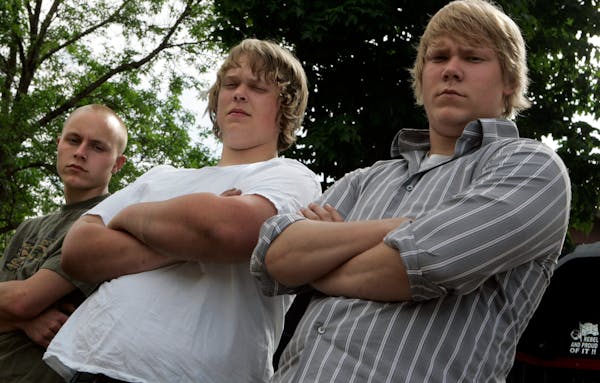Two controversies involving schools, kids and flags have made recent news in Minnesota. But the cases had radically different outcomes.
The first occurred in May at Dilworth-Glyndon-Felton Junior High. Four eighth-graders refused to stand while the rest of their class recited the Pledge of Allegiance to the American flag. The kids got one-day, in-school suspensions. But school officials lifted the suspensions immediately after the American Civil Liberties Union of Minnesota fired off a letter pronouncing that the First Amendment protected the students' conduct.
The ACLU's letter warned of dark consequences for school officials who had violated the eighth-graders' free-expression rights. Teachers could be sued personally. School authorities should apologize to students. The ACLU cited soaring language from First Amendment court cases: "Freedom to differ is not limited to things that do not matter much. ... The test of its substance is the right to differ as to things that touch the heart of the existing order."
Let's turn now to the second incident, last week at Bloomington Kennedy High School. Three seniors arrived on the last day of school in trucks flying the Confederate flag. They said they were Dukes of Hazzard fans, celebrating the Southern lifestyle.
Kennedy officials suspended the students for three days, barring them from their graduation ceremony.
Again the ACLU weighed in -- but this time with a helpless shrug. Any challenge to the school's action would have a "very, very slim" chance of succeeding, the organization's leader told the Star Tribune.
Why was the sacred "right to differ" suddenly, well, gone with the wind? Chuck Samuelson, executive director of the ACLU of Minnesota, says courts have held the First Amendment doesn't protect student speech that is judged to be "a material disruption of the educational process." That means Kennedy officials can decide that "at this particular school at this particular time, the Confederate flag" is disruptive and "might provoke violence." About 20 percent of Kennedy students are black, according to the Minnesota Department of Education.
But what if a large percentage of Dilworth students are patriots? Couldn't disrespect to the American flag risk disruption there?
Whose 'right to differ'?
I'm sympathetic to school administrators -- it's tough keeping order at schools these days. But civil libertarians are supposed to fight for the "right to differ," not imagine ways it can be squelched.
The reasoning on display here opens the door to political correctness ruling the day. At Dilworth, the kids were disrespecting the flag and stiffing the establishment -- classic '60s New Left stuff -- so they get a halo. At Kennedy, on the other hand, NASCAR-type, Dukes of Hazzard kids get the ax, with the ACLU's whimpering acquiescence.
The implications of all this are troubling, as Samuelson acknowledges. The notion that free expression is limited by how offensive some find it, and how likely they are to turn violent, creates a "heckler's veto," potentially allowing every sufficiently intolerant group to silence those with whom they disagree.
Free expression has more protection outside schools. And in the past, the ACLU has not been intimidated by arguments that the threat of disruption should trump free-speech rights. Take the famous 1978 Skokie case, in which the ACLU defended Nazis' right to march through a neighborhood filled with Jewish holocaust survivors. Opponents of allowing the march used the disruption argument, but the ACLU didn't heed it.
Down the road, where might the disruption argument lead? If a speaker goes to a high school or college campus to speak in favor of the Iraq war or against same-sex marriage, the authorities can say it is "disruptive" because it's likely to offend, so it's prohibited despite the First Amendment?
Samuelson says that the ACLU is disturbed about the "heckler's veto" and he believes the Kennedy students should have been allowed free speech. But the trend in the courts away from student rights is clear, and the First Amendment "is not absolute," he says.
If we're going to link the First Amendment and disruption, we have a timely case close at hand. The ACLU is seeking permits under the First Amendment for thousands of protesters to demonstrate as close as possible to the site of the Republican National Convention in September. Yet at least one protest group that advocates "militant direct action" has boasted of its plans to block freeways, confront police, shut down the convention and paralyze the whole Twin Cities.
Sounds mildly disruptive. Let's just hope they don't bring any Confederate flags, or things might get out of control.
It's a topsy-turvy world.
Katherine Kersten • kkersten@startribune.com Join the conversation at my blog, www.startribune.com/thinkagain.
Finding an apartment may be easier for California pet owners under new legislation
What to stream this weekend: Conan O'Brien travels, 'Migration' soars and Taylor Swift reigns
Reality TV's Chrisleys are appealing their bank fraud and tax evasion convictions in federal court
Music Review: Taylor Swift's 'The Tortured Poets Department' is great sad pop, meditative theater

